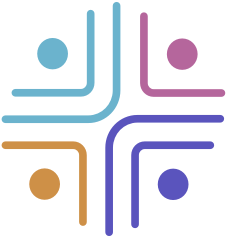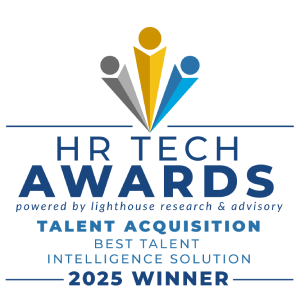From the rise of experimental hiring to a shifting focus on Gen Z, here are 15 answers to the questions, “What influential talent sourcing trends are you noticing in 2023?”
Rising Experimental Hiring
As job hunting and recruitment parameters grow more and more flexible, experimental hiring has been on the rise too, and 2023 might very well be the year when it gains even more traction.
The concept, after all, works for both employees and employers. With this non-committal approach to hiring, a short stint at a company allows both parties to acknowledge the arrangement and decide whether it can work in the long term. If the chemistry is right, everyone involved renegotiates terms and reaches a more permanent agreement. If it doesn’t work, both parties can move on just as quickly.
Understandably, this formula cannot be applied in every industry, but it sure opens the door to positive experimentation in recruitment.
Riley Beam, Managing Attorney, Douglas R. Beam, P.A.
Switching to Quiet Hiring
Quiet hiring isn’t an entirely new concept—think of it as a blend between internal hiring and upskilling employees so that organizations fill roles and skill gaps by retraining their current workforce.
There are a lot of potential benefits here, both for employers and employees alike. For starters, you’re decimating your hiring costs because you no longer have to start a tedious talent hunt. Instead, you can work at increasing the productivity within your teams and create a future-proof workplace that’s constantly growing. For employees, this presents a great opportunity to level up their existing skill sets and even pick up new skills along the way.
Jess Rodley, Director of Operations, Dialed Labs
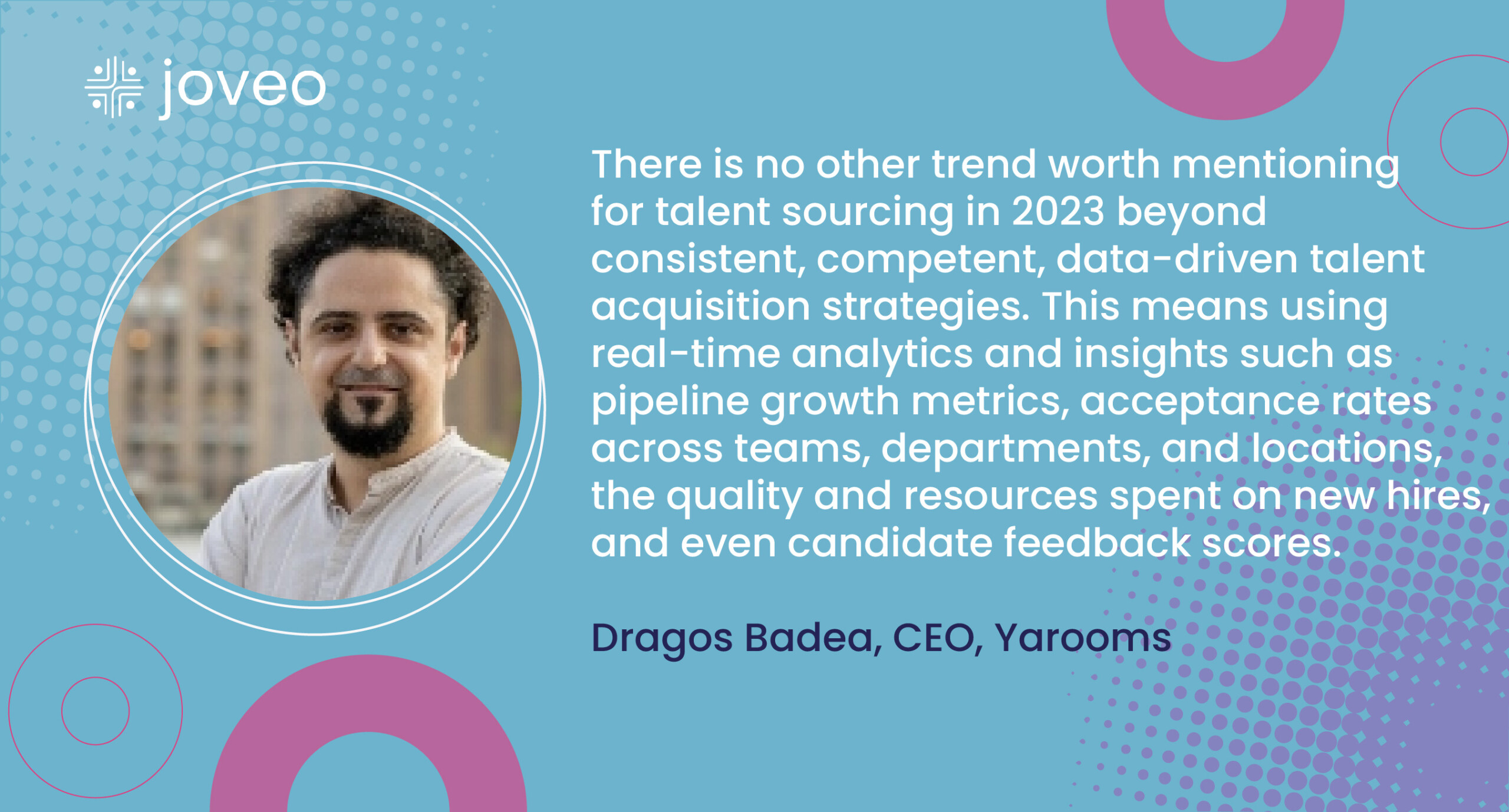
Accelerating Dominance of Data-driven Recruitment
There is no other trend worth mentioning for talent sourcing in 2023 beyond consistent, competent, data-driven talent acquisition strategies.
This doesn’t just mean investing in the latest software, though you likely will still need to do that; it means ensuring that a data-driven mindset governs recruitment teams when putting together recruitment strategies for the year. This means using real-time analytics and insights such as pipeline growth metrics, acceptance rates across teams, departments, and locations, the quality and resources spent on new hires, and even candidate feedback scores from the recruitment process.
Organizations that do not embrace a heavy lean on data will have an incredibly hard time competing with sourcing talent, nurturing job seekers, and hiring the top candidates in 2023 and beyond.
Dragos Badea, CEO, Yarooms
Emphasizing Employer Branding
In a tight labor market, it’s not enough to simply advertise a job posting and wait for applications to come in, and with the unemployment rate still low despite the recent inflation, it remains a tight labor market in many industries.
Related to this challenge is the fact that job seekers are more selective than they were in the past. Not only do they have specific needs regarding work environment, flexibility, and work-life balance, an increasing number of employees today want to work for a company that shares their values and has a culture conducive to their work style and mental health.
Just expressing this in the job posting isn’t enough – that will only catch the individuals who are already interested in the role enough to be looking at the posting.
Employer branding is a more effective way to show what your company offers its employees to anyone who explores your website, social media profiles, or other information sources, expanding the range of applicants you get.
Jon Hill, Chairman and CEO, The Energists
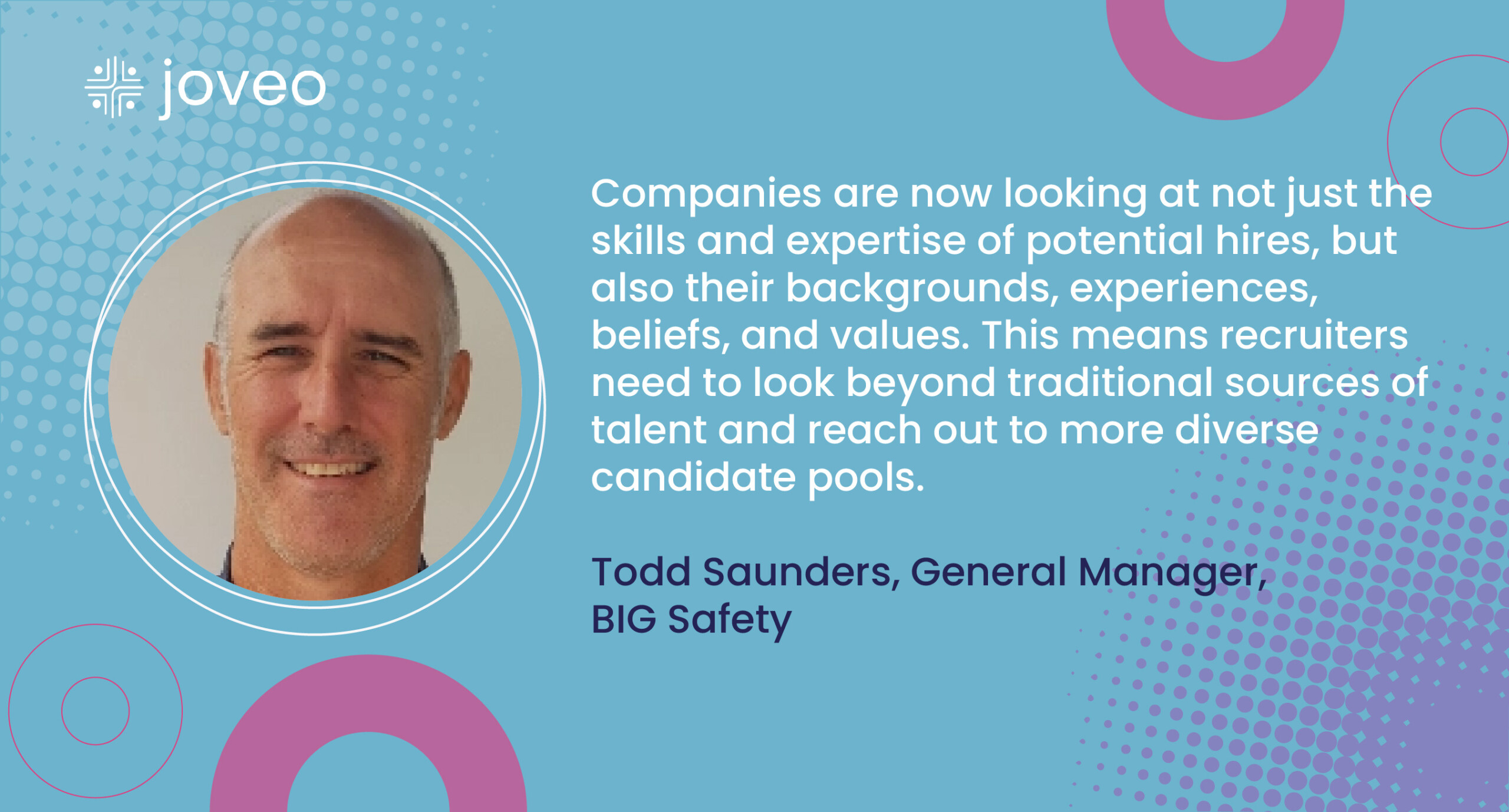
Diversifying the Workplace
As companies notice the need for greater diversity, equity, and inclusion in their workplaces, diversifying their talent pool will become a major focus in 2023.
Companies are now looking at not just the skills and expertise of potential hires, but also their backgrounds, experiences, beliefs, and values. This means recruiters need to look beyond traditional sources of talent and reach out to more diverse candidate pools. To do this successfully, organizations will need to invest in diversity and inclusion initiatives, work with external partners to source candidates from diverse backgrounds, and create programs to retain minority employees.
By focusing on diversifying their talent pool, companies can ensure that they have access to the best talent available.
Todd Saunders, General Manager, BIG Safety
Creating Bespoke Employee Benefits
As a broader trend, I think we’re going to see bespoke employee benefits as not only one of the core talent sourcing trends in 2023, but also a means of retention in a time when retention is everything for growing businesses.
From choosing hybrid work days to elements of a training and development package, talent is much more likely to be attracted to your role if they feel they have a sense of individuality within it, which relates directly to their development and means of working (on their terms).
Wendy Makinson, HR Manager, Joloda Hydraroll
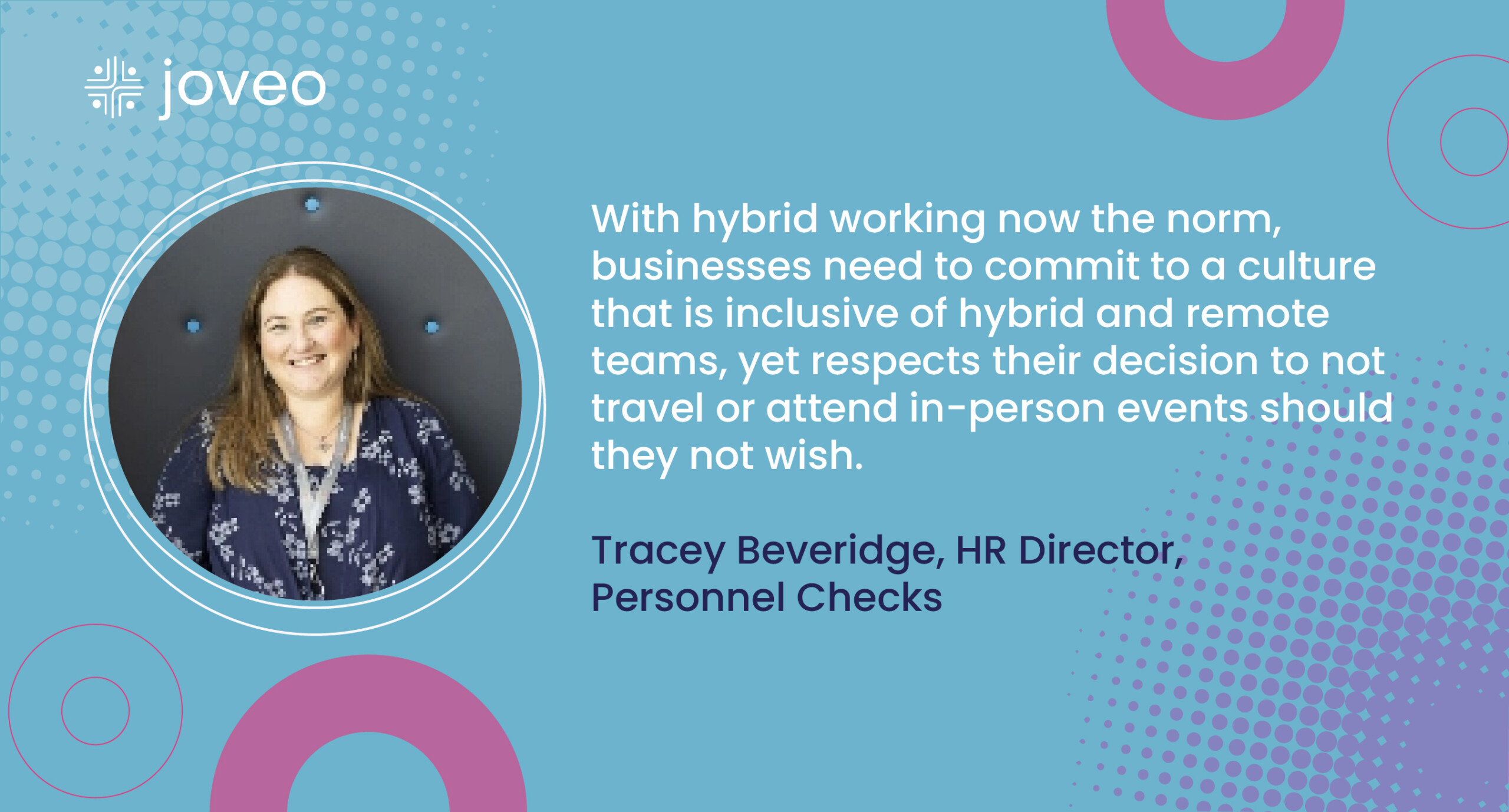
Focusing on Business Culture
There simply has to be a greater focus on business culture that does not revolve around an internal office environment. With hybrid working now the norm, businesses need to commit to a culture that is inclusive of hybrid and remote teams, yet respects their decision to not travel or attend in-person events should they not wish.
This could be anything from bespoke training packages to flexible working schedules, and it’s something that businesses need to implement sooner rather than later, both as a means of talent sourcing and existing employee retention.
Tracey Beveridge, HR Director, Personnel Checks
Evaluating Online Reputations
New hires today have often been on the Internet their entire lives, and believe me – recruiters are looking at those old social media profiles. And while I’m not eliminating anyone for hijinks in their childhood, there can be red flags and deal-breakers hidden deep in one’s online history. If I don’t find them, chances are someone else will – usually at a less opportune moment.
Anyone looking for a job in 2023 should know the pitfalls of social media. While problematic statements in your past can be difficult to face, tackling them head-on shows a willingness to learn and change, so be honest and open if they’re brought up.
Rob Reeves, CEO and President, Redfish Technology
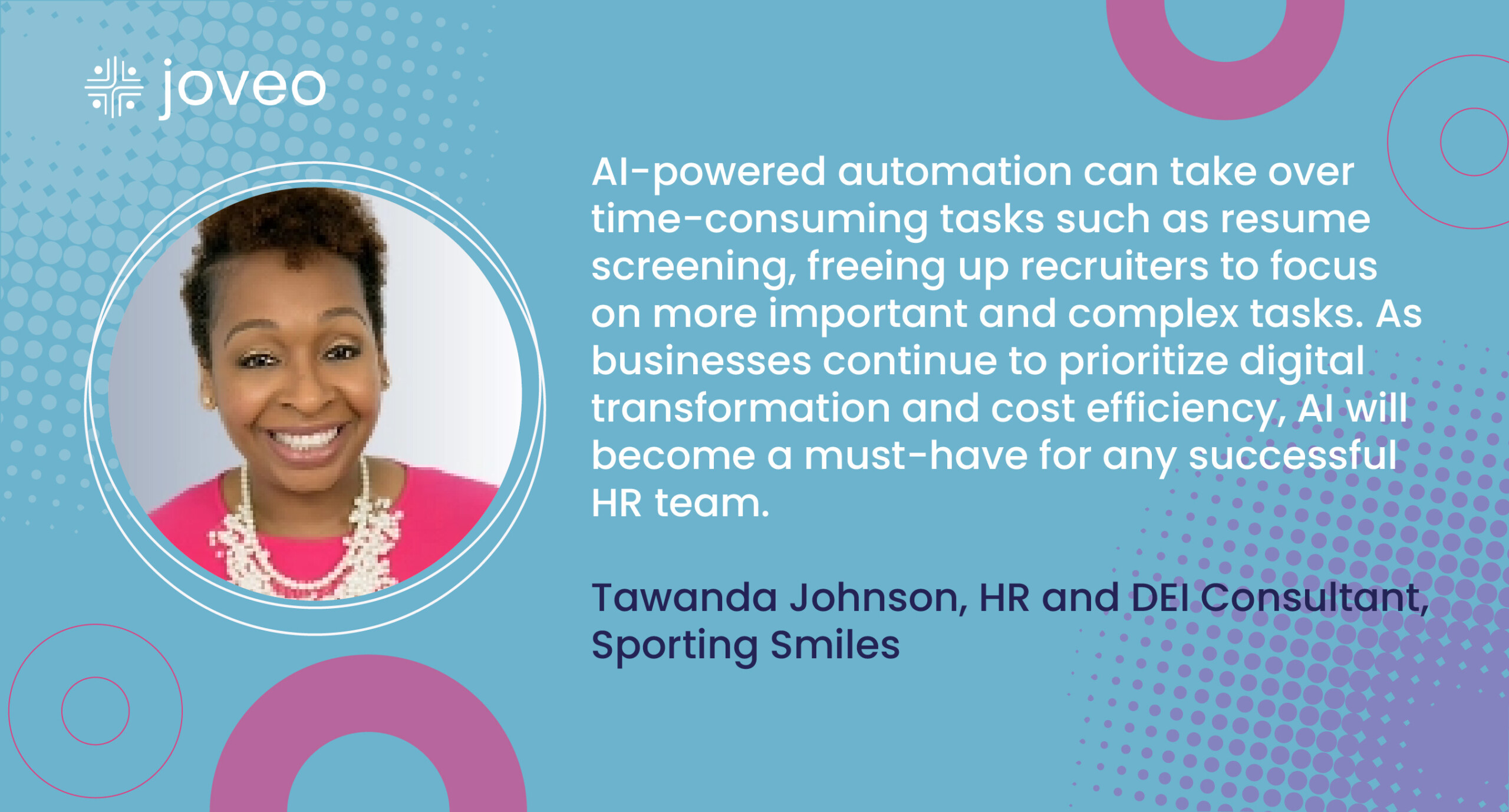
Developing Stronger AI
In 2023, the primary trend in talent sourcing will be AI technology and automation. AI is quickly becoming an integral part of the HR landscape, as it can streamline the recruitment process and help employers find the best-fit candidates more efficiently.
AI-powered automation can take over time-consuming tasks such as resume screening, freeing up recruiters to focus on more important and complex tasks. As businesses continue to prioritize digital transformation and cost efficiency, AI will become a must-have for any successful HR team.
Tawanda Johnson, HR and DEI Consultant, Sporting Smiles
Recruiting via Virtual and Hybrid Platforms
Virtual and hybrid recruitment is becoming increasingly popular because of the flexibility and cost-effectiveness they offer. By utilizing virtual tools and platforms, companies can reach a larger pool of candidates, regardless of their location, and save on travel costs and time spent on in-person recruitment events.
Virtual and hybrid recruitment can help to create a more inclusive and accessible recruitment process, allowing candidates with disabilities or remote locations to take part more easily. As technology continues to advance, virtual and hybrid recruitment are likely to play a significant role in the future of talent sourcing.
Kimberley Tyler-Smith, VP, Strategy and Growth, Resume Worded
Perfect your talent sourcing with community outreach, DE&I events, employee referrals, and more.
Make Successful Talent Sourcing a Reality!
Growing Investments in Recruiting Technology
By 2023, we predict that more and more businesses will invest in the latest recruiting technology to maximize their talent-sourcing efforts. This includes tools like AI-driven candidate sorting algorithms, automated resume screening, and even virtual interviews that can help employers identify the best candidates faster and easier than ever before.
These advancements can save time and money while still ensuring that the right fit for each role is identified. Companies that invest in these technologies will be forward-thinking and attractive to potential job seekers.
Yusuf Shurbaji, Co-Founder and Managing Partner, Prismfly
Hiring From Within
While efforts will continue to be made to grow candidate pools from outside sources, in 2023, the most prevalent trend will be to recruit from within. A talent shortage has caused the staffing crisis, through the loss of valuable team members from employment changes or simple resignations.
Therefore, in order to readily identify talent, businesses are now sourcing from within, as the abilities of current team members have already been vetted. In addition, by prioritizing internal hiring, they create incentives for professional growth and advancement to better retain employees.
As businesses continue to make efforts to source talent in 2023, they will increasingly look within to find proven candidates and improve their team retention.
Alexandre Bocquet, Founder and CEO, Betterly
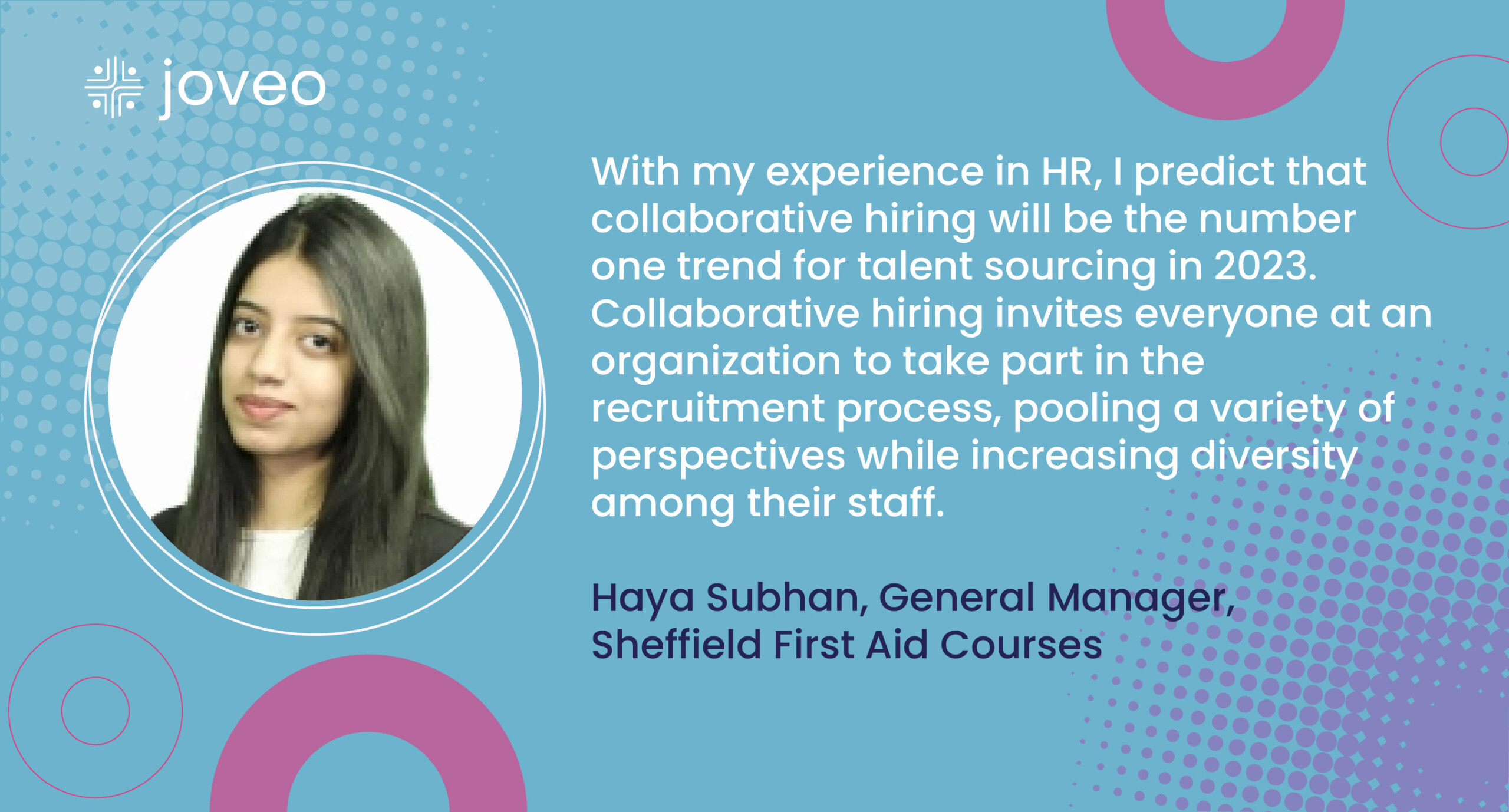
Turning to Collaborative Hiring
With my experience in HR, I predict that collaborative hiring will be the number one trend for talent sourcing in 2023. Companies are increasingly beginning to recognize the value of collective decision-making and collaborative partnerships in finding qualified employees.
Not only does collaborative hiring improve the selection process by tapping into the collective knowledge and expertise of team members, but it also can help provide additional opportunities for assessing a potential employee’s values and qualifications.
Collaborative hiring invites everyone at an organization to take part in the recruitment process, pooling a variety of perspectives while increasing diversity among their staff. Without collaborative hiring, talented people who may otherwise fly under management’s radar could pass through unnoticed.
Haya Subhan, General Manager, Sheffield First Aid Courses
Promoting Employee Wellbeing
If the past few years have taught us anything, it’s that employee wellbeing is paramount. Instances of quiet quitting, burnout, and resignation have risen, and candidates are increasingly citing mental health benefits as a priority when considering joining a company. Therefore, I predict that a focus on wellbeing will be at the forefront of talent sourcing strategies in 2023.
This also applies to recruiters themselves, who have been facing additional challenges as they adapt to the ever-changing hiring landscape. It’s important for C-suite executives to understand this and implement initiatives which support recruitment staff. This might look like investing in tools which automate repetitive tasks, which can feel dull and disheartening.
This also allows hiring personnel to focus their skills, attention, and energy on where they are most needed without feeling overworked. Putting policies in place which promote wellbeing is beneficial for existing employees, and attractive to new recruits.
Kathy Bennett, CEO and Founder, Bennett Packaging
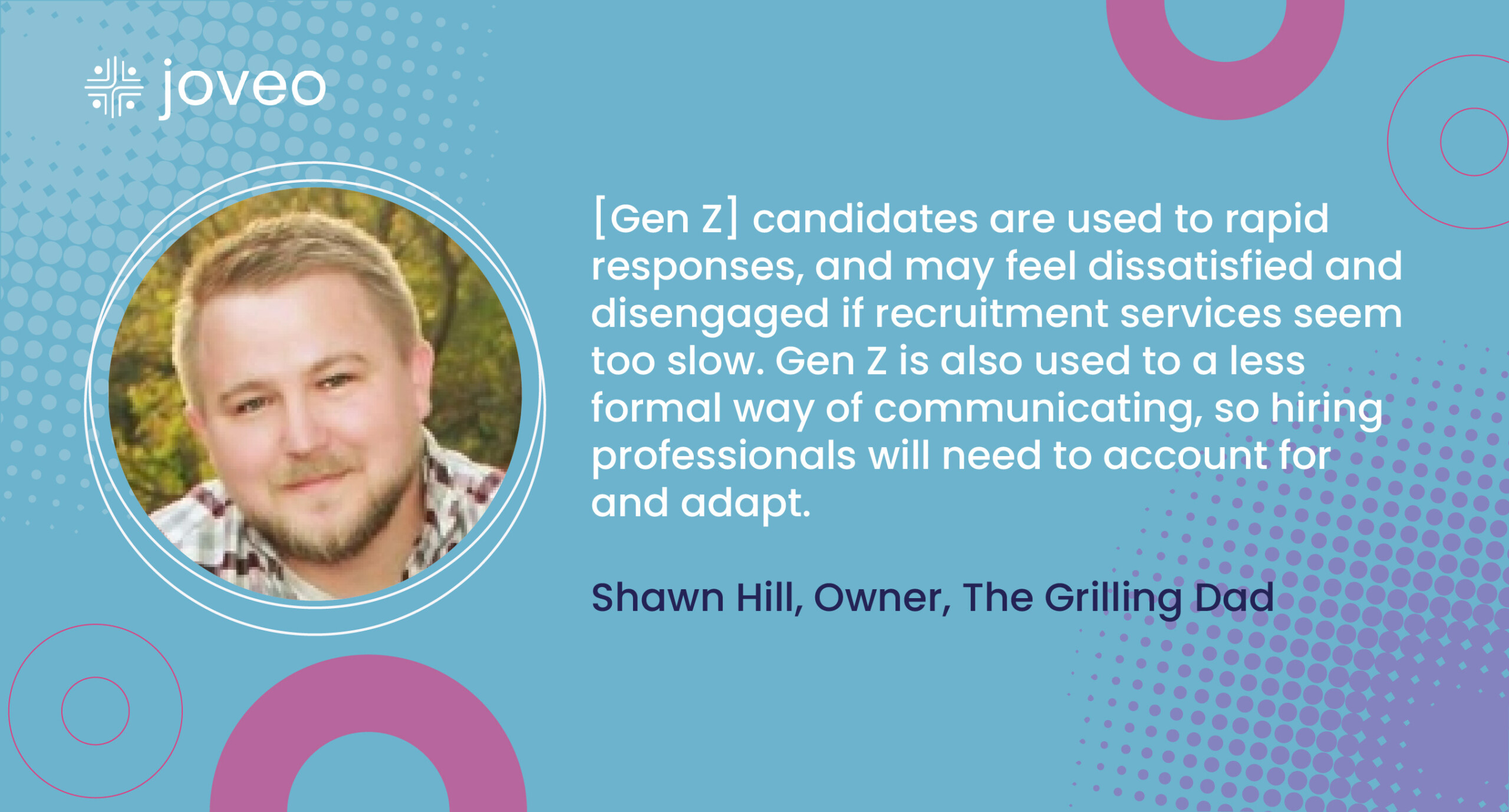
Paying Attention to Gen Z
As Gen Z candidates enter the workforce, this will precipitate a shift in recruitment tactics, procedures, and policies. Gen Z has a unique relationship with technology than preceding generations and will expect recruitment methods to be up-to-date and technologically advanced.
Companies will need to focus on mobile-optimized application processes if they want to ensure engagement. They will also need to consider enhancing automation options, as these candidates are used to rapid responses, and may feel dissatisfied and disengaged if recruitment services seem too slow.
Gen Z is also used to a less formal way of communicating, so hiring professionals will need to account for and adapt, using tools such as social media to reach out and connect. Many Gen Zs also avoid phone calls, so offering alternatives is essential. Their priorities and needs will differ from those of older workers, so recruiters will need to accommodate these in order to attract top talent.
Shawn Hill, Owner, The Grilling Dad
Wondering how to up your talent sourcing game in 2023? Well, that’s an easy fix – just ask us for a demo! And don’t forget to follow us on Twitter and LinkedIn.
